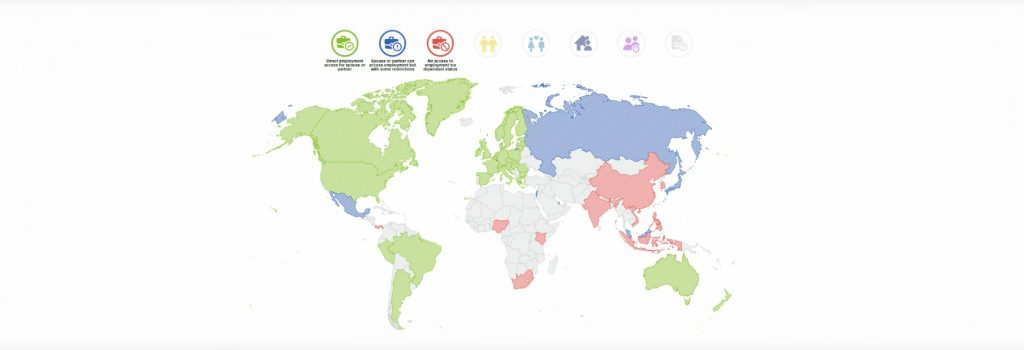Permits Foundation has unveiled a new interactive feature that can help organisations and individuals instantly identify ‘best practice countries’ that enable direct work access for dependants of mobile employees.
Open to all
Now you can go straight to the Permits Foundation website to see where in the world partners / spouses can – and can’t, and maybe can – work. The user-friendly world map of mobile spouse and partner employment access is open to anyone and everyone and will undoubtedly prove to be a useful tool for Global Mobility / HR staff as well as prospective expat partners.
Scanning the globe
After opening the webpage, you can simply hover your cursor across the responsive world map to see which nations go ‘green’ (where partners / spouses can work), ‘yellow’ (where partners / spouses can work with certain restrictions / requirements in place) or ‘red’ (can’t work, based on dependant status). You can then click on a specific country for more detailed info as regulations and immigration laws, of course, vary from country to country.
So what’s ‘green’?
As long as there is at least one piece of legislation in a country that enables direct employment access for partners and spouses of highly-skilled mobile employees then the country is ‘green’. Green countries include all EU nations, the UK, USA, Australia, Brazil, Canada and New Zealand. Where a country is blue (for example, Russia, Japan, Mexico), restrictions will apply.
And what’s ‘red’?
Where a country is ‘red’ (for example, South Africa, India, China, Nigeria), work access may not be possible via dependant status. However, in some cases partners / spouses might still be able to get their own work permit in a ‘red’ country, but they will just have to do so off their own bat (or, ahem, with the help of personalised support).
Extra info
The world map also provides interactive information on a number of other categories, for example, which countries a) allow partners to be self-employed, b) recognise same-sex marriages, c) recognise non-married partners and d) where other family members can access work, too. Wherever possible, the country pages also provide links to immigration guides / laws that can help partners or HR / Global Mobility teams clarify the legal playing field in that location.
Image: edited screenshot from Permits Foundation website, November 2020





